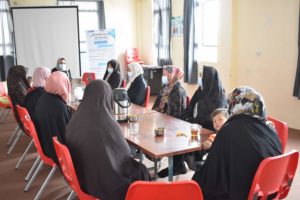“My story of mental health challenges begins when my father forced me to marry a man who did not understand anything about life,” Nasima shares.
“There was always violence in his family; my mother-in-law was beaten by her husband.” For Nasima, days passed in much the same way until they started having children. First, they had a little girl, and two years later, had another little girl. “With the birth of our second daughter, my husband and his family were very upset. Their affronts were increasing day by day, and they were continually insulting me because I had another daughter.”
Things continued in this way until Nasima had her third child – a boy. “When he was born, life started looking up, and I had more good days,” Nasima reflects. For a while, things went well, but before long, her son – still young – became ill and died.
“His death darkened my life and my mental health was worse than before. I wanted to be alone. Most of the time I did not want to do the housework or even talk to anyone. This made my husband even angrier and he beat me.”
For several years, Nasima carried on this way. But one day, at the insistence of a neighbour, she went to a council meeting in their area. “They talked about mental health in the meeting, and council members spoke about mental health services,” she says. “As the council members spoke about things like isolation, violence, and the reluctance to engage in daily activities that I was experiencing, I thought I might have a mental illness.” When Nasima recognised so much of what they were saying to be true for her, too, she discretely got the address of the centre and went there the next day.
After the first visit, the doctor diagnosed her with depression.
“A year has passed since then, and after a year of receiving treatment, my mental health has improved. I am once again interested in housework. Now I take better care of my children and this situation has had a very positive effect on the atmosphere of my home. My husband and family have changed how they act as well, and sometimes my husband comes to the mental health centre with me.”
“Joining this group and our local council meetings has helped me have hope in my life, learn new things, and help people who have similar problems,” she shares. With support from the group and the local council, she was even able to join a work programme and learn vegetable pickling. “It has been three months since I first made pickles in my house and sold them to my neighbors, friends, and relatives. This has made me busy, helped me to focus less on life’s problems, and even helped my family with our expenses.”
“I am thankful for the constant support of IAM and the local council, who help many people like me,” Nasima says.
The effects of our mental health projects are far-reaching – not just for those who participate directly, like Nasima has, but also for her family and families like hers.
Read more here to learn more about each of these projects.
